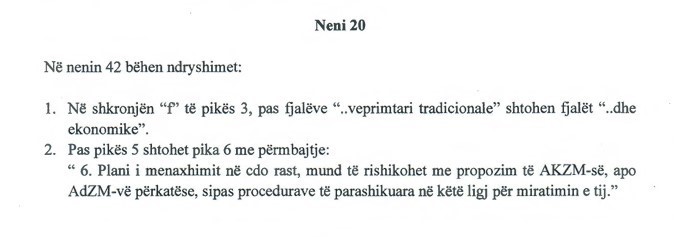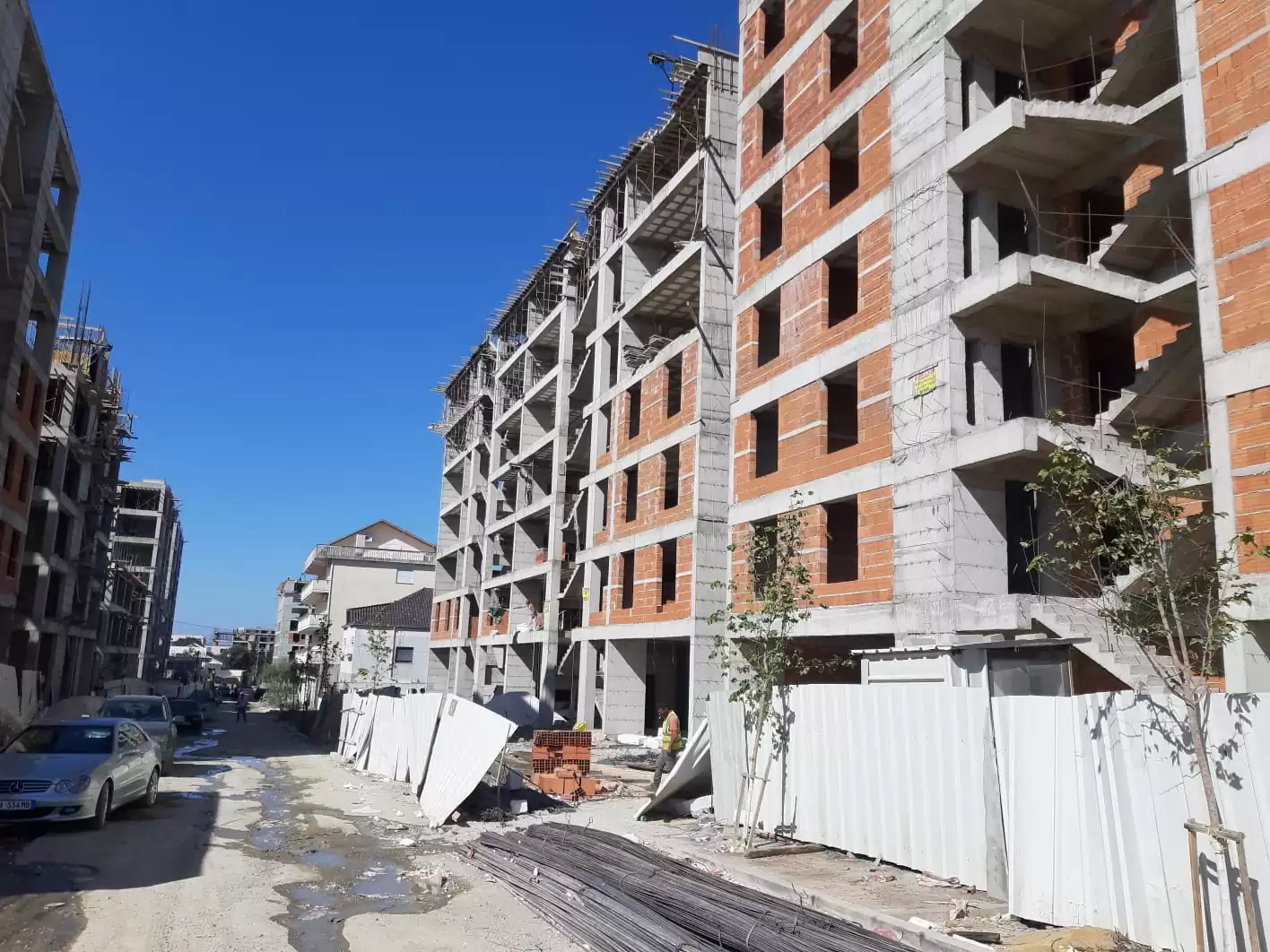BY ILDA HOXHA
Amendments of ‘Law on Protected Areas’ paves the way to construction in these areas, as it grants municipalities the right to manage at least 20% of their territory. The initiative was submitted to the Parliament by 12 MPs of the Majority arguing that the new draft law will stop depopulation. However, environmental experts warn that the draft law will completely eliminate Protected Areas, with Narta at the top of the list, followed by other coastal areas, having destructive consequences for flora and fauna.
On November, 12 Socialist Party MPs signed and deposited a draft law in the Parliament requiring amendment of Law No. 81/2017 “On Protected areas. Some of the proposed amendments are related to the competences of municipalities in Protected Areas and permitting constructions in such areas.
Article 6 of the draft law : “On some addendums and changes on Law No. 81/2017 “On Protected Areas” stipulates: “In Article 8, paragraph 3/1 is added after paragraph 3, stating: “3/1. The respective Municipality, shall administer in any case, no less than 20% of the protected areas falling within the territory of that municipality.
In the proposal for the amendment of Article 16, which includes National Parks, it is emphasized that projects approved by the National Territorial Council (NTC), proposed by the Ministry of Environment, or municipalities are allowed.
“In letter ‘c’ of paragraph 2, after the phrase … long distance systems of gas …. is added the phrase apart of; projects approved by the National Territorial Council (NTC) proposed by the responsible Ministries or respective municipalities where the national importance of the investment is highlighted, and the investment adheres to the highest environmental protection criteria and has the lowest impact on nature and biodiversity”, is stated in Article 10 of the draft law.

Meanwhile, a proposed amendment has been given for Article 42, where in letter ‘f’ of Paragraph 3, after the words ’ ‘traditional activities’ the words ‘and economic’ are added.

Prime Minister Edi Rama supported the draft law in a speech given during an event for Vjosa National Park, emphasizing that amendments have been requested by the municipalities.
“We need luxury tourism for ordinary people. Ordinary people gain higher incomes through luxury tourism. We are in the reviewing phase of protected areas following a request by an increasing number of mayors who are aware of nature conservation and are under great pressure for economic development; A combination of these two is a must.” stated Rama
Faktoje addressed a request for information to the Parliament of Albania and to the National Agency of Protected Areas regarding these proposed amendments. The Parliament clarifies that amendments have been requested by a group of MPs from the Parliamentary Group of Socialist Party.
On the other hand, NAPA (National Agency of Protected Areas) argues:
Ministry of Environment and Tourism, as part of the European Integration process, has taken the initiative to review environmental legislation and align it with the legislation and directives of the European Union, in accordance with the requirements outlined in this process.”
Furthermore, within the framework of these decisions, the Ministry adds that amendments are foreseen even in the Law on Protected Areas.
“According to this order, drafting of the Draft Law ‘On some amendments to Law No. 81/2017 “On Protected Areas” is also being set out, which is subject to this process in accordance with the legal framework in force,” the National Agency of Protected Areas emphasizes in its official response.
The experts: The draft law eliminates Protected Areas
The environmental expert, Lavdosh Ferruni, in an interview with Faktoje, warns:
“This draft law shall completely eliminate Protected Areas. Protected areas will only remain on paper, whereas they will no longer exist in reality. This law undermines the entrance gates to the protected areas. There are now no more barriers to enter protected areas.
The Law on Protected Areas in Albania, both that of 2004 when it was first established and of 2017 when it was revised, was drafted on the basis of global experience; it was not made up for sure. Meanwhile, what is happening now is that Albanian government is inventing a law, which, taking into consideration the articles that need to be amended, it is practically undermining the ‘Law on Protected Areas.’ In the most extreme case, protected areas will practically be the same as any other area of the territory.”
Ferruni explains the reasons behind this law.
“One of the reasons is the desire of oligarchs, who apparently have exhausted urban spaces and are now seeking opportunities in other areas, such as the protected ones, where they see significant profit possibilities, disregarding the environmental impact.
Their aggressiveness is intertwined with an eagerness that mayors across Albania share to have more opportunities to intervene in the territory through various tenders. This partnership between oligarchy and eagerness of local leaders leads to such a draft law, which would create a bad reputation for Albanians in the general world opinion on the mismanagement of the country,” the environmental expert says.

Lavdosh Ferruni, Environmental Expert
Ferruni also explains the environmental damages that, according to him, a law allowing constructions in protected areas would bring.
There is still highly diverse biodiversity in the Protected Areas in Albania, which would be irreversibly damaged. Fauna, in particular, which is more sensitive to these interventions, will leave the territory of Albania. Under these circumstances, we would have a country with a drastic decline of its fauna and undoubtedly of its flora too. The special natural aspect of Albania will be irreversibly destroyed by the intensive interventions that will take place there,” he argues.
According to the environmental expert, this draft law would turn Albania from a tourist attraction into an undesirable destination for a large group of tourists who prefer nature.
Olsi Nika from ‘EcoAlbania’ says that these amendments are fundamentally contrary to nature conservation principles, and according to him, this overview of changes leads to the strongest ‘earthquake’ regarding the legal framework of nature conservation in Albania.
“These amendments are clearly and fundamentally at odds with nature conservation principles, and as such, they are entirely unacceptable from our perspective.
It is clear that the goal of these amendments is not the effective conservation and management of protected areas, but rather their alteration, annexation, non-restriction and making these spaces and natural resources they bear available to rapid, intensive, and immediate economic development.
All this overview of changes fundamentally presents the strongest and the irreversible ‘earthquake’ as regards the legal framework of nature conservation in Albania, risking the entire loss of our natural heritage in the medium term,” Nika argues.

Olsi Nika, Environmental Expert
Furthermore, the environmental expert emphasizes that the law needs a comprehensive review to align with the objectives of the integration processes and new realities.
“The rush to give more competencies to Municipalities in the ‘administration’ of Protected Areas, taking them away from specialized institutions like National Agency for Protected Areas (AZKM), at a time when municipal capacities are profoundly limited to fulfill even those they currently have, is in itself a preliminary and refractory step that is known where it leads: emergencies and relinquishing governance, ultimately resulting in the administration of these areas by private entities, whose fundamental function revolves around profit maximization and nature conservation abandonment.
Moreover, adoption of ‘sui generis’ models through these amendments not only creates a dangerous precedent that could lead to destruction and disintegration of protected areas, but could also place Albania in a quite challenging position regarding international commitments and integration processes,” Olsi Nika from “EcoAlbania explains.”
What areas does this draft law put at risk?
As far as these amendments are concerned, sources that requested to remain anonymous told Faktoje that the most endangered areas are the coastal ones.
“For me, the areas at risk are the coastal ones, pointing specifically to Velipoja, Narta, perhaps a bit also to Divjaka, which face development pressure. They are seeking to build resorts and there is a clear and evident tendency in Narta’s case. The area from the airport towards the lagoon has been designated as a development area. In my opinion, this concept is for powerful people to have investing opportunities,” environmental experts explain.
According to the same source, the pressure to amend the law comes due to interests of private businesses.
A provision has been added indicating that no less than 20% is to be managed by local authorities. I think that Ministry of Environment is for sure behind this because it supports the interests of municipalities. They have the right to be further developed, however this way of giving is the worst thing that can happen.
I think that this pressure is not exerted by municipalities, but by the private sector aiming to be developed in these areas. And, having found a closed door with Protected Areas, the private sector has now found the open door of the Municipalities,” he adds.
What do the initiating deputies say?
Some of the majority MPs who signed the draft law argued in the Commission for Productive Activities, Trade, and Environment that this will also contribute to slowing down the depopulation of cities.
Depopulation of these areas is concerning us and if we want to stop it, we must give these people the opportunity, according to regulations applied for protected areas, to minimally exploit and develop such areas,” Arben Pëllumbi, MP, argued.
On the other hand, the Socialist Party MP, Ismet Beqiraj, calls for strict controls against cementation of these areas.
Will all buildings within these areas, including archaeological parks, be legalized for the sake of economic development, risking their cementation? If this is done without control instruments, we’ll have unpleasant consequences. They should go through everything, examine every criteria and parameter, not with a magnifying glass, but with an electron microscope”, MP Beqiraj said.
Faktoje also reached out for a comment to the Ministry of Tourism and Environment regarding this draft law that has sparked quite a discussion and, according to experts, poses a risk to protected areas. However, we haven’t got an answer from the institution in question up to the moment of publishing this article.






